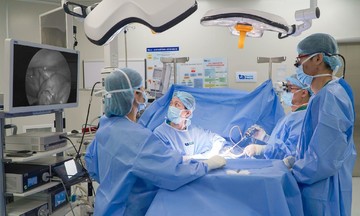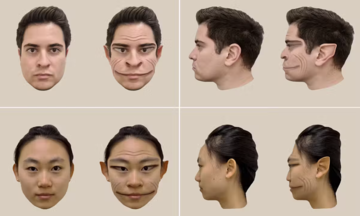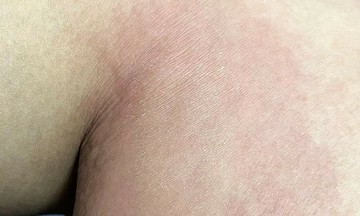Carter, an American, recently experienced severe urinary problems, including nocturia, frequent urination, insomnia, and recurring urinary tract infections. Doctor Nguyen Tan Cuong, deputy head of the Urology Department at the Urology - Nephrology - Andrology Center of Tam Anh General Hospital in TP HCM, reported that Carter's prostate was significantly enlarged, measuring approximately 70 ml, nearly double the normal size. The presence of bladder trabeculation (thickening of the bladder wall) indicated long-term urinary obstruction due to the enlarged prostate pressing on the urethra.
The doctor recommended a holmium laser enucleation of the prostate (HoLEP) procedure. This technique is effective even for prostates larger than 80 ml and is particularly suitable for patients at risk of bleeding.
 |
Doctor Cuong (left) and Doctor Pham The Anh performing the HoLEP procedure on Carter. Photo: Tam Anh General Hospital |
Doctor Cuong (left) and Doctor Pham The Anh performing the HoLEP procedure on Carter. Photo: Tam Anh General Hospital
Doctors Cuong and Anh used a laser to enucleate and remove almost the entire prostate tissue through a minimally invasive endoscopic procedure. With the assistance of a tissue morcellator, the enucleated tissue was extracted through the urethra. A urinary catheter was placed for 24 hours, and the bladder was continuously irrigated with saline solution. Two days after the surgery, Carter recovered and was in stable condition.
 |
Doctor Cuong visiting Carter before his discharge. Photo: Tam Anh General Hospital |
Doctor Cuong visiting Carter before his discharge. Photo: Tam Anh General Hospital
Benign prostatic hyperplasia is a common condition in men over 60 and a leading cause of lower urinary tract symptoms, including difficulty urinating, urinary retention, frequent urination, and nocturia. According to Doctor Cuong, while the condition can be treated with medication, surgery is often necessary. The HoLEP procedure is a preferred surgical option for treating this condition due to its minimally invasive nature, reduced bleeding, and preservation of pelvic organ function. Patients recover quickly, have a lower risk of infection, and experience fewer post-surgical complications such as urethral stricture, retrograde ejaculation, and a low recurrence rate.
Ha Thanh - Ngoc Ha
*The patient's name has been changed.












